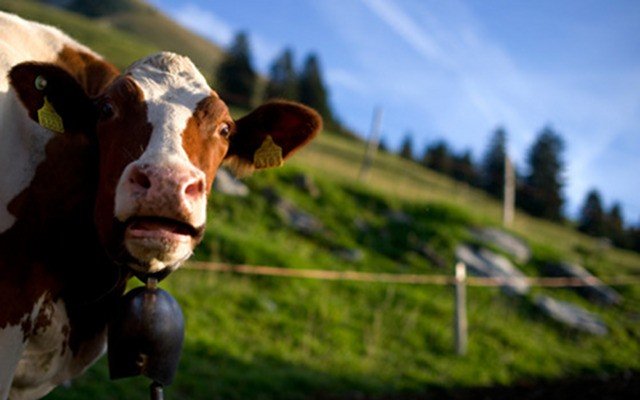There are a lot of taxes in the world, but among them there are very ridiculous...!
Sun tax

In the early 2000's in the Balearic Islands imposed a tax on the sun. Every tourist visiting the islands (Ibiza, Mallorca and others) is required to pay one euro per day. This money is sent to clean the coast areas, restore ecology. It is known that in 2012 there were about 10.4 million foreign tourists. Conclusion: the income from the tax on the sun in the treasury proved to be very significant.
Fecal tax from cattle

In 2008, a tax on excrement from cattle was introduced in Estonia. In this country there are no numerous large enterprises that pollute the atmosphere. Therefore, it was decided to take the tax from the owners of cows. The main air polluters Estonian parliamentarians considered it to be local burenok, which in the process of life emit methane into the atmosphere. Interestingly, pigs, horses and other livestock were not
The tax to the peace

It is known that the countries of West Africa are among the poorest in the world. People living in the Republic of Guinea still pay peace tax, although there are no military operations in the country right now. Every year civilian life costs the citizens about € 17.
Tax on gypsum

In Austria, there is a tax on gypsum. It is known that Austria is one of the most popular countries in Europe for ski holidays. Every year lovers of snowboarding and skiing come here. The authorities imposed a mandatory tax on these tourists. According to statistics, approximately 150,000 newcomers of skiing holidays are injured every year during skiing. The total amount of their treatment for the year exceeds a billion shillings. Therefore, the Austrian authorities charge an additional tax on athletes, already included in the cost of ski services, at each descent. All collected means of power are transferred to medical institutions in Austria for the treatment of fractures and other various injuries.
Tax on disposable chopsticks

A huge number of trees undergo felling for the manufacture of these sticks. A person uses them once, and then throws them away. The Chinese authorities not only thought about this issue, but also introduced a tax on the use of disposable chopsticks. Now, Chinese residents have to pay 5% of the sale of each pair of wooden sticks to the state treasury. According to statistics, about 25 million trees are cut annually to make disposable sticks.
Shadow tax

In Venice, in 1993, a tax on shadow was introduced. Owners of urban institutions, whose buildings fall from the buildings on the municipal land, are required to pay a certain fee. And yes, the tax must be paid not only on sunny, but also on cloudy days, and there are much more in Venice.
Civil marriage tax

It appeared in the Middle Ages in Holland, when lovers professing different religions could not marry. Gradually, such relations became more popular and spread throughout the world. Now, according to statistics, the number of couples living in a civil marriage exceeds the number of registered couples. But not in China. In this country, a special tax on civil marriage is introduced - one thousand yuan per couple is annually collected. The question arises. How will the authorities find out about people living together but not bonded in marriage? Very simple. The method of "denunciation": the violation of the authorities inform the neighbors.
The tax on dances

Egypt boasts one of the most original taxes of our time. In this country, belly dancers should diligently replenish the state treasury with their money. Currently, the belly dance tax is included in the top 5 Egypt's income items. This art brings, according to various estimates, up to $ 400 million a year.
Tax on dust

Relatively recently, the Armenian authorities imposed a dust tax. Everyone who owns a living space must pay two drams (about fifteen kopecks) per square meter. The Ministry of Economy of Armenia decided that the population must pay for the costs of dust removal. It does not matter, it's clean in the house or not. The tax must be paid.
Tax on noise

This tax is valid in Switzerland. Each aircraft taken off at Geneva and Zurich airports since 1980 is subject to this tax.
Tax on sparrows

In the 16th century, a tax on sparrows was introduced in the German city of Württemberg. The reason was the fact that ringing birds prevent people from living peacefully. From the owner of each house they demanded the destruction of a dozen sparrows, for which he received six Kreuzers. If the task was not carried out, it was required to pay twice as much to the treasury. The most lazy citizens even bought the right amount of dead sparrows from underground traders.
Window tax

For more than 150 years, there was a tax on windows in England. It was introduced in 1696. Eventually, these funds became trivial inextricably to the British, and they began to lay "extra" windows with a brick. It reached the point of absurdity: new houses were built without a single window. Sales of glass shops fell at times. Complained and doctors: because of the lack of daylight in the dwellings of the townspeople settled dampness, fungus - across England spread epidemics and infections. The public began to actively oppose the strange tax. It was canceled.
Tax on ears

In 1926, for the maintenance of his army, the Dalai Lama introduced a tax on ears in Tibet. Those who lost one ear in battle, then for the first time felt lucky: they were supposed to pay only half of the amount.
In general, at the turn of the XIX-XX centuries. Tibet was in the lead in the number of very different extravagant taxes. Residents had to pay tax on the wedding, on the birth of children, on the right to sing, dance, ring the bell and beat the drums. A tired traveler was not allowed to even just take a nap on the grass: for a night's lodging he had to pay tax to the owners of the land. In total, 1892 taxes were levied in favor of the state!
Beard tax

It is known that this type of fee for the beard was introduced by Peter I in Russia. Also, a special beard was created, which was a metal token that was issued after paying a special fee for the right to wear a beard. On the token were two inscriptions knocked out: on one side - "Money is taken", on the other side - "Beard - extra burden". The duty was so great that those who wanted to keep their beards had to shell out a lot.
Eye Color Tax

In the 18th century, eye tax was introduced in Bashkiria. The darker the eyes, the less money was paid. The fact is that according to the then existing concepts, the original inhabitant of Bashkiria, whose parents were also native Bashkirs, undoubtedly should have an exceptionally black eye color. Therefore, the eyes with the lowest eyes were black. The fee for them was only 2 altyn. For the gray eyes had to give up already seven altins. For green and blue - ten and thirteen alten, respectively.
@kinderman
Thank you for your visit!
I like the beard tax. Mine isn't growing anyway. :D
You could also buy some Monsanto and Nestlé shares and hope for a water tax and a breathing tax.
Downvoting a post can decrease pending rewards and make it less visible. Common reasons:
Submit
I agree with you!)
Downvoting a post can decrease pending rewards and make it less visible. Common reasons:
Submit
Wow, these are so funny and outrageous, love the photos. Taxes and laws that don't make sense come from those that are leading the nations, we are in for a bumpy ride that is for sure.
Downvoting a post can decrease pending rewards and make it less visible. Common reasons:
Submit
Thank you for your visit!
Downvoting a post can decrease pending rewards and make it less visible. Common reasons:
Submit
Lol these are jokes, maybe the sun tax should be "human footprint tax" as its kind of legit in conservation preservation
Downvoting a post can decrease pending rewards and make it less visible. Common reasons:
Submit